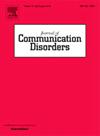Maximizing the use of practice-based clinical data to track social communication development in autistic preschoolers
IF 2.1
3区 医学
Q2 AUDIOLOGY & SPEECH-LANGUAGE PATHOLOGY
引用次数: 0
Abstract
Purpose
Evaluating caregiver-delivered programs in clinical settings is necessary to generate practice-based evidence. One challenge of such research is the burden placed on clinicians to complete additional measurement tools. This exploratory study examined the validity of clinical forms already completed as part of the standard delivery of the More Than Words® (MTW) program and explored whether this clinical data would reveal distinct clinical and outcome profiles in real-world contexts.
Method
The Social Communication Checklist (SCC), a MTW program-specific form completed by the speech-language pathologist, was collected for 36 autistic preschoolers during publicly funded delivery of MTW. We assessed the concurrent validity of autistic preschoolers’ social communication stage and skills rated on the SCC pre- and post-program with two of their scores on reliable, validated tools: the Communication Function Classification System (CFCS) and the Focus on the Outcomes of Communication Under Six (FOCUS-34). We also explored autistic preschoolers’ communicative participation outcome profiles on the FOCUS-34 with their assigned social communication stages on the SCC.
Results
Autistic preschoolers’ pre-program social communication stage on the MTW SCC correlated with their pre-program CFCS communication level and FOCUS-34 score. Most children showed positive social communication changes post-program according to the SCC, and two-thirds showed meaningful or possibly meaningful clinical change on the FOCUS-34; however, scores on these measures did not correlate. Autistic preschoolers at different pre-program SCC stages showed distinct communicative participation outcome profiles on the FOCUS-34.
Conclusion
Program-specific clinical forms like the SCC can be valuable for classifying autistic preschoolers’ social communication skills, exploring differences in outcomes, capturing novel outcomes, and generating practice-based evidence.
最大限度地利用基于实践的临床数据来跟踪自闭症学龄前儿童的社会沟通发展
目的在临床环境中评估护理人员提供的项目对于产生基于实践的证据是必要的。这类研究的一个挑战是临床医生完成额外测量工具的负担。这项探索性研究检查了作为More Than Words®(MTW)项目标准交付的一部分已经完成的临床表格的有效性,并探讨了这些临床数据是否会在现实环境中揭示不同的临床和结果概况。方法收集36名自闭症学龄前儿童在公共资助的MTW实施过程中,由语言病理学家填写的社会沟通量表(SCC)。我们用两个可靠的、经过验证的工具:沟通功能分类系统(CFCS)和关注六岁以下沟通结果(Focus -34)来评估自闭症学龄前儿童在SCC项目前和项目后的社会沟通阶段和技能的并发效度。我们还探讨了自闭症学龄前儿童在FOCUS-34上的交流参与结果概况及其在SCC上指定的社会交流阶段。结果自闭症学龄前儿童MTW SCC的节目前社会交际阶段与其节目前CFCS交际水平和FOCUS-34得分相关。根据SCC,大多数儿童在项目后表现出积极的社会沟通变化,三分之二的儿童在FOCUS-34上表现出有意义或可能有意义的临床变化;然而,这些指标的得分并不相关。不同节目前SCC阶段的自闭症学龄前儿童在FOCUS-34上表现出不同的交际参与结果。结论特定项目的临床形式,如SCC,可以对自闭症学龄前儿童的社会沟通技能进行分类,探索结果的差异,捕捉新的结果,并产生基于实践的证据。
本文章由计算机程序翻译,如有差异,请以英文原文为准。
求助全文
约1分钟内获得全文
求助全文
来源期刊

Journal of Communication Disorders
AUDIOLOGY & SPEECH-LANGUAGE PATHOLOGY-REHABILITATION
CiteScore
3.30
自引率
5.90%
发文量
71
审稿时长
>12 weeks
期刊介绍:
The Journal of Communication Disorders publishes original articles on topics related to disorders of speech, language and hearing. Authors are encouraged to submit reports of experimental or descriptive investigations (research articles), review articles, tutorials or discussion papers, or letters to the editor ("short communications"). Please note that we do not accept case studies unless they conform to the principles of single-subject experimental design. Special issues are published periodically on timely and clinically relevant topics.
 求助内容:
求助内容: 应助结果提醒方式:
应助结果提醒方式:


